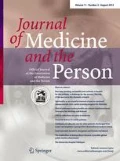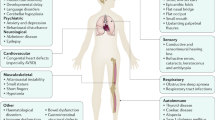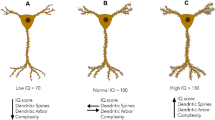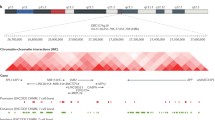Abstract
Down syndrome (DS) is the most frequent constitutional form of intellectual disability in humans. In 1958 Jérôme Lejeune discovered that children with DS have one extra copy of chromosome 21 (trisomy 21) in their cells. Lejeune considered the trisomic cells as “drug addicted”, intoxicated by the excess of gene products that are formed due to the presence of the additional chromosome. If we knew the pathogenetic mechanisms we could devise a more specific therapy. Lejeune, a genial geneticist and biochemist, was also a pediatrician who visited thousands of children with intellectual disability, encouraging their families, highlighting the enrichment in humanity experienced by so many families because of the presence of a person with DS and not only the problems. He dedicated all of his life and so much love to these children, and at the same time he would correct the biochemical errors which hamper the full expression of their human abilities and he used to say: “Hate the disease, love the patient: that is the practice of medicine”. To date, no therapy is recognized as being effective in improving the cognitive abilities of persons with DS. Research was slowed by the fact that so many studies have been focused on prenatal diagnosis of the syndrome rather than on its treatment. Following the encounter with Lejeune’s history and work, we have started a systematic study of DS to integrate clinical, biochemical, genetic and bioinformatic data in order to identify novel therapeutic targets for this form of trisomy.

Similar content being viewed by others
References
Skotko BG, Levine SP, Goldstein R (2011) Self-perceptions from people with Down syndrome. Am J Med Genet A 155A:2360–2369. doi:10.1002/ajmg.a.34235
Lejeune J, Gautier M, Turpin R (1959) Etude des chromosomes somatiques de neuf enfants mongoliens. C R Hebd Seances Acad Sci 248:1721–1722
Lejeune-Gaymard C (2012) Life Is a Blessing: A Biography of Jérôme Lejeune. Jérôme Lejeune Foundation, Paris, France and the National Catholic Bioethics Center, Philadelphia, PA
Lejeune J (1970) The William Allan Memorial Award Lecture. On the nature of men. Am J Hum Genet 22:121–128 http://publications.fondationlejeune.org/article.asp?filename=fjl182A.xml
Rehen SK, Yung YC, McCreight MP, Kaushal D, Yang AH, Almeida BS, Kingsbury MA, Cabral KM, McConnell MJ, Anliker B, Fontanoz M, Chun J (2005) Constitutional aneuploidy in the normal human brain. J Neurosci 25:2176–2180. doi:10.1523/JNEUROSCI.4560-04.2005
Vitale L, Casadei R, Canaider S, Lenzi L, Strippoli P, D’Addabbo P, Giannone S, Carinci P, Zannotti M (2002) Cysteine and tyrosine-rich 1 (CYYR1), a novel unpredicted gene on human chromosome 21 (21q21.2), encodes a cysteine and tyrosine-rich protein and defines a new family of highly conserved vertebrate-specific genes. Gene 290:141–151
Costa AC, Scott-McKean JJ (2013) Prospects for improving brain function in individuals with Down syndrome. CNS Drugs 27:679–702. doi:10.1007/s40263-013-0089-3
Strippoli P, Pelleri MC, Caracausi M, Vitale L, Piovesan A, Locatelli C, Mimmi MC, Berardi AC, Ricotta D, Radeghieri A, Barisani B, Basik M, Monaco MC, Ghezzo A, Marco Seri M, Guido Cocchi G (2013) An integrated route to identifying new pathogenesis-based therapeutic approaches for trisomy 21 (Down syndrome) following the thought of Jérôme Lejeune. Sci Postprint 1(1):e00010. doi:10.14340/spp.2013.12R0005
Jiang J, Jing Y, Cost GJ, Chiang JC, Kolpa HJ, Cotton AM, Carone DM, Carone BR, Shivak DA, Guschin DY, Pearl JR, Rebar EJ, Byron M, Gregory PD, Brown CJ et al (2013) Translating dosage compensation to trisomy 21. Nature 500:296–300. doi:10.1038/nature12394
Lejeune J (1992) The Concentration Can: When Does Human Life Begin? An Eminent Geneticist Testifies. Ignatius Press, San Francisco
Giussani L (1997) An education in freedom. The religious sense. McGill-Queen’s University Press, Montreal, pp 125–131
Lejeune J (1988) Research on pathogeny of mental retardation in trisomy 21. Commentarii Vol. III N° 31, Pontificia Academia Scientiarum, Rome, Italy http://publications.fondationlejeune.org/article.asp?filename=fjl378.xml
Acknowledgments
This article is based on the transcript of the talk presented at MedConference 2013, Florham Park, NJ, and reprinted here with the very kind permission by Dr. Elvira Parravicini. I would give very special thanks to the few persons in Bologna that have remained in my Laboratory of Genomics [web site 4] following the relaunch of our research on trisomy 21: Lorenza Vitale, Maria Chiara Pelleri, Allison Piovesan and Maria Caracausi. I am grateful to all the other coauthors of our article [8], describing in detail our new clinical-experimental project aimed at finding molecular targets to cure intellectual disability in persons with Down syndrome, and to Prof. Maria Zannotti. Finally, I am endebted to Clara Lejeune for her wonderful book, “Life is a blessing”, about her father.
Conflict of interest
None.
Author information
Authors and Affiliations
Corresponding author
Rights and permissions
About this article
Cite this article
Strippoli, P. Trisomy 21: research for a cure and rediscovery of the thought of Jérôme Lejeune. J Med Pers 12, 104–110 (2014). https://doi.org/10.1007/s12682-014-0181-6
Received:
Accepted:
Published:
Issue Date:
DOI: https://doi.org/10.1007/s12682-014-0181-6




